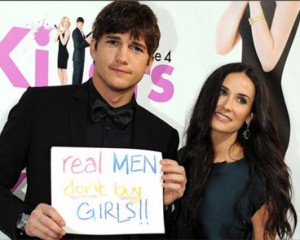This is a guest post by Jessica Mack. Jessica is a global feminist and reproductive rights advocate. She enjoys exploring, making trouble, speaking out, and learning languages. She’s very tall, so that makes her extra scary. Jessica is an editor at Gender Across Borders and currently lives in Seattle, planning her next adventure.

If you haven’t yet watched the “Real Men Don’t Buy Girls” campaign from Demi Moore and Ashton Kutcher’s DNA Foundation, do. And be prepared to scratch your head, or maybe weep a little bit.
Others have already have already pointed out the confusing and offensive messages of the campaign, which feature hunky celebs delivering messages of what real men do (i.e. laundry, cook, iron, read directions, etc.) to suggest what they shouldn’t (i.e. buy girls). Sadly, what surely began with good intentions has become an even better example of what is wrong with celebrity aid today.
Even before the launch of the “Real Men” campaign, the DNA Foundation, launched in 2007, rubbed me the wrong way. I first came across them last year, while doing research on anti-trafficking efforts. Their mission is to “raise awareness about child sex slavery, change the cultural stereotypes that facilitate this horrific problem, and rehabilitate innocent victims.” So how will they achieve their goals? The action center offers “three steps to end child slavery” (ready?): 1) Make your own “Real Men Don’t Buy Girls” video; 2) “report” any suspicious activity on Craigslist; and 3) buy a tee-shirt.
My problem is less with these suggestions as it is with the implication that these activities will end child slavery. When supporting any kind of development initiatives or charity work, you need two essential things: comprehensive information (about the issue, about key players in the field) and a healthy dose of reality. There are very few (if any) panaceas or over-night fixes.
The website is an homage to hyperbole and generalization. The first sentence tells readers, without citation, that “more people are slaves today than ever before and the numbers are soaring.” The gratuitous use of the word “slave” in anti-sex-work circles is borderline exploitative, and suggests that all individuals engaging in sex work are slaves who need rescue. The truth is predictably more complex.
Sex trafficking and slavery are some of the most complicated and layered global development issues out there, and these ads allow for no nuance. By making it about men and geared toward men, the ads suggest that there is no one else involved. In fact, trafficking and slavery involve many players – some women, some men, and even family members.
Women’s experiences are erased. A gradient exists among those who have been kidnapped and enslaved and those who are engaging in sex work commercially and voluntarily. It’s easy for anti-trafficking efforts to devolve into a paradigm whereby a [privileged] [man] rides in on a white horse to “rescue” a [poor] [woman]. With this dynamic, it’s easy to steamroll over the individual rights and dignity, and complicated personal experience, of the individual.
As Alanna Shaikh pointed out in her analysis of Greg Mortenson’s (Three Cups of Tea) unfortunate fall from grace, the public is constantly looking for that panacea and that happy ending. Sometimes we allow that
simple lie to continue because we don’t want to accept that road to success if far messier, far more meandering. Initiatives like DNA, which focus only on the end point – a total end to sex slavery – and suggest it’s easy to get there risk actually undermining everything it really takes to get there. And in that over-simplification is where women’s rights, voices, and experiences get squashed.
Sometimes efforts to address one end of the spectrum end up hurting those at the other, and sometimes good intentions do a lot of harm. In 2008, for instance, Cambodia passed the “Law on Suppression of Human Trafficking and Sexual Exploitation” to comply with the US policy on trafficking in persons. This basically set in motion a series of brothel raids that resulted in the abuse and criminalization of sex workers, and the unraveling of many effective health outreach programs, which used brothels as a platform.
I want to give them credit for drawing attention to this horrible issue… but what if the attention they draw is ill-informed and misaligned? Isn’t that more harm than good? Demi and Ashton could at least take note as one celebrity initiatives after another has flopped, for different reasons, but mostly for what Shaikh points to: Hope for a better world, but the lack of mettle to actually get there. Madonna’s Raising Malawi recently folded in a heap of disgrace, Kanye West’s foundation for high school drop-outs just mysteriously closed, and even Greg Mortenson’s Central Asian Institute might fall into this camp.
Celebrity aid has now become a development issue in itself, (maybe soon warranting a new arm of the Global Fund?) and aid critics like Bill Easterly have discussed the fundamental flaws at length. Why not just support existing programs doing good work instead of leveraging your fame to start your own (ineffective and competing) efforts? The best thing that could happen now is Demi and Ashton pass the mic to someone who knows what they’re talking about, and some damage control can begin.
This post originally appeared at Gender Across Borders.